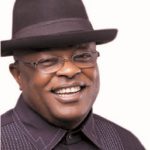Sule Lamido, a Real Northern Star
Ken Ugbechie
Recently, I had cause to go up North. Destination: Dutse, capital of Jigawa State where Alhaji Sule Lamido is the governor. In recent years, a confederacy of reasons has made the North a no-go area for some Nigerians and even foreigners. The bogey of Boko Haram has raised the threshold of insecurity in some parts of the North. It was therefore a natural impulse for visitors to grow the bumps when invited to this part of the country. But to Dutse I must go to keep a private appointment.
The flight to Kano was painless, so was the road ride to Dutse. If I was expecting to see a rural capital as we can conveniently tag some state capitals in Nigeria, I got the shock, a pleasant one, of my life. Dutse, a sleepy town I visited about a decade ago, has suddenly lost its rural innocence. Well paved roads, ensigns of urbanisation, good hospitals, clean and decent schools and a buzz of activities on the streets were constant reminders to any visitors that Jigawa has transformed from its old backwater veneer to a commercially-vibrant state. My host, a childhood friend who had braved his way to the North fresh out of school, attributed the transformation to the leadership of Lamido.
The makeover of EPZ Motel and relocation of Police Mounted Troops Barracks office and Quarters as well as the completion of clinic infrastructure and Immigration Office are some of the evidential tokens to buttress the claim of Lamido loyalists that the Jigawa governor is a silent revolutionary leader.
In a country where infrastructure is deficient and successive governments have looked away from the attendant rot, it is such a great feeling to find an oasis of hope in a desert of despair. Sule Lamido’s leadership philosophy is such that guarantees opportunity for all categories of people. This is to be seen in his social security agenda in which he paid grants to the feeble and the needy. Such socialist posturing initially attracted acrid criticisms to the governor. Paying monthly stipends to persons living with disability was interpreted in some quarters as too simplistic an approach to fighting poverty but the latter day testimonies of the recipients have more than sufficiently justified the decision of the governor. Many of those recipients have themselves channeled the cash to productive ventures and are no longer economic overweight to the state but builders of the economy.
Lamido’s model of economic empowerment is fitly captured in the diversity of capacity building opportunities he has created for men and women in the state especially the lowly people through the acquisition of skill sets and granting of soft loans to get their businesses off the ground.
In the Lamido mindset for development, good health, liberation of the mind through sound education, security of lives and property and a roof over one’s head should take primary positions in the order of needs. This model mirrors the acceptable global model as enshrined in the United Nations human development index. Whether by default or design, the Jigawa governor, constrained by meagre resources, has keyed into a developmental model that recognises the people as the greatest asset in any society.
Often, it tends to deceit when humanity measures development by retinue of automobiles, housing estates and imposing edifices or even by the lustre of marbled offices and homes. These structures and developmental indicators are good but they not in themselves fully attest to the true development stature of any community. Yet, even at that, Jigawa has a good measure of such structures including housing estates built by the Lamido government. But the greatest achievement of the governor, in my reckoning, is the steady rise in the quality of education and the growing investment in human capital development through scholarship for further studies both at home and overseas.
If statistics from the National Bureau of Statistics in anything to go by, the North is shortchanged in the national literacy equation. Therefore, any leadership in this part of the country that does not recognise the need to give an extra push to education does more harm to the people. This is the sense in which Lamido’s quiet revolution in education evidenced by the remodeling of schools, establishment of a state-owned university, building of laboratories and equipping them, staff quarters and provision of sundry amenities and infrastructure that would make for good learning ergonomics, would etch his name in the boulders of history.
It is possible that some persons from Jigawa may not notice the strides of the governor. It is even possible that some others measure his achievement by the growing number of automobiles in the streets and byways of the state. In a country with a long history of misgovernance, you cannot possibly blame those who are deceived by such infrastructural totems as symbols of development. Yet, the real development is the investment in the people. Today, we do not measure the development of the Japanese or Chinese by the number of exotic cars on their roads or the constellation of high-rise buildings glazing their skylines but by their knowledge quotient through which they have affected and influenced the global economy. If tomorrow comes and Jigawa becomes the Japan of Nigeria, it is because a Sule Lamido planted the seed today. This, to me, is purposeful leadership.







